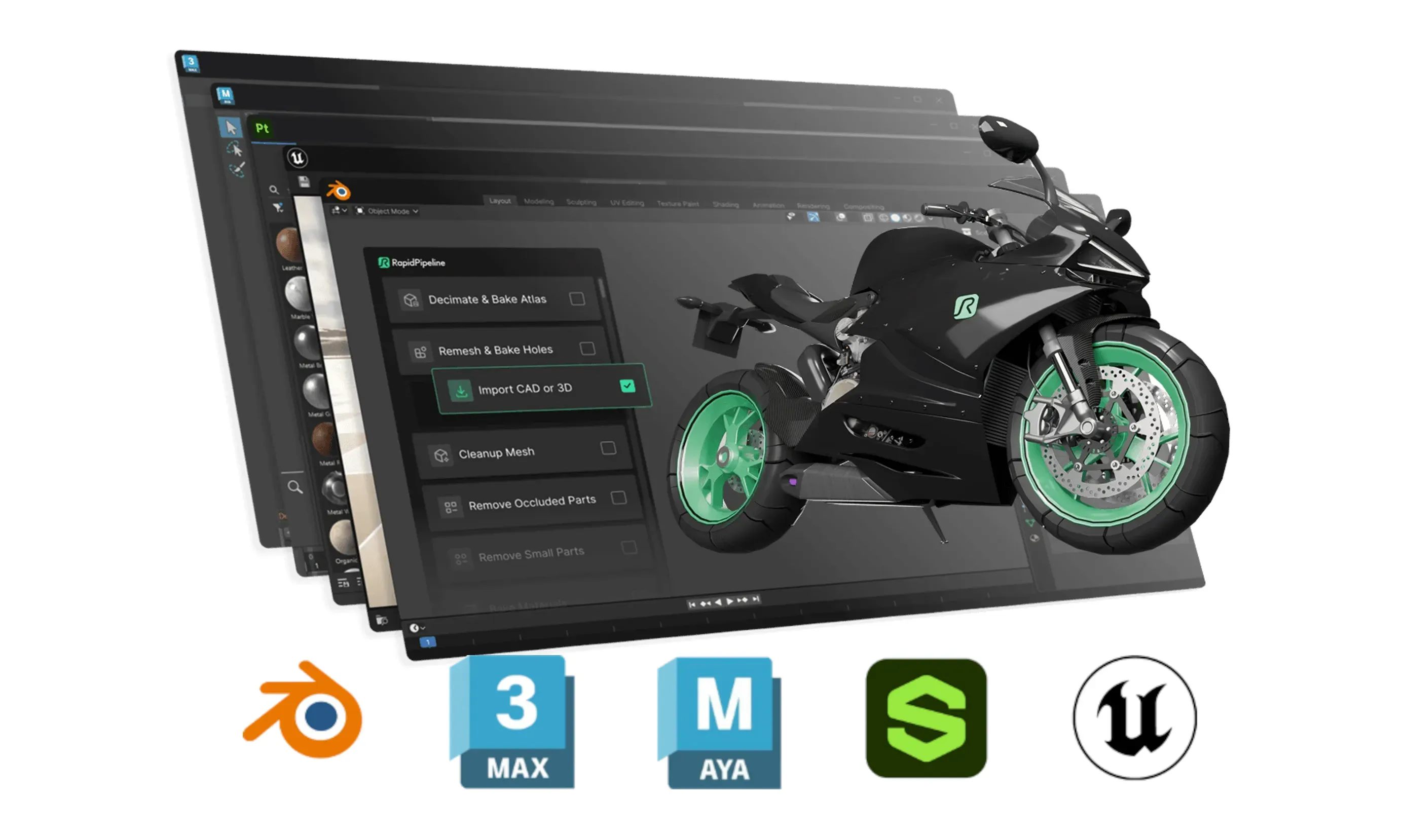
SIGGRAPH 2023: USD, Omniverse, MaterialX and RapidPBR (RapidPipeline DCC Importer)
Table of Contents
SIGGRAPH 2023 was a great success for DGG in many ways. With team members attending the conference for the first time, a booth four times the size of last year’s, and a special visitor, we were very happy with the conference, exhibition and the feedback we received on our product RapidCompact (now RapidPipeline 3D Processor) and the new extension RapidPBR (now RapidPipeline DCC Importer).
USD, AOUSD & Omniverse
Continuing the recent trend, Pixar’s OpenUSD framework (USD) was again one of the predominant topics at the conference. With the Alliance for OpenUSD (AOUSD) having formed between Adobe, Autodesk, Apple, Pixar and NVIDIA, a fundamental level of alignment on a powerful standard has been reached within the industry. This amazing step forward will enable easier workflows for content creation, optimization and distribution, through broad adoption within rendering software and DCCs.
With our RapidCompact (now RapidPipeline 3D Processor) software and company supporting USD already for more than four years now, we are more than excited to see this standard finally being broadly pushed forward by other key players – and naturally we haven’t been resting since our first USD support became available. Concretely speaking, this year, we extended RapidCompact’s (now RapidPipeline 3D Processor) capabilities for USD import and export a lot further. Especially in terms of coverage of features and visual consistency of processed materials.
One of the most important goals: providing the best possible output for NVIDIA Omniverse. As a partner of NVIDIA and member of their inception program, we are proud to support them on their mission to enable developers to quickly create scalable 3D and powerful applications for rendering and simulation. Therefore, we were incredibly honored and excited to present our latest advancements personally to NVIDIA CEO Jensen Huang at the DGG booth at SIGGRAPH, after his keynote on Tuesday.

MaterialX & OpenPBR
MaterialX, as maintained by the Academy Software Foundation, is an open standard for the handling of materials in computer graphics. Allowing to formulate different kinds of material descriptions, and translations between those, in a standardized way that is also compatible with integration into USD (see above). With faithful representation of real-world materials across different rendering systems still being one of the industry’s major challenges, it is no surprise that MaterialX – together with USD – received a lot of attention at SIGGRAPH this year. We believe that it has great potential to become the default way in which we specify portable material descriptions across various tools.
A novelty in the space of virtual materials, first broadly discussed at SIGGRAPH this year, is a subproject of MaterialX entitled OpenPBR. The goal of this new material model, supported by Autodesk and Adobe alike, is to provide a unified successor to the Autodesk Standard Surface and Adobe Standard Material shading models. We are very excited about this huge step, which will help the whole ecosystem move forward by unifying the way that content creation tools handle virtual material models. Not to be confused with RapidPBR (see below), which is a technology to port material models to PBR, OpenPBR is an actual material model that can be used with MaterialX.
New Extension – RapidPBR (now RapidPipeline DCC Importer)
SIGGRAPH visitors and our online audience both got the chance to apply for our brand-new RapidPBR closed beta! RapidPBR (now RapidPipeline DCC Importer) helps developers and 3D artists to automatically create PBR-ready assets from CGI content – a complex task that involves much more than “just” format conversions. In our closed beta, we are providing translation capabilities from V-Ray to glTF. Support for more systems is about to follow. RapidPipeline DCC Importer is now available in all plans (3dsMax / V-Ray Import).

Chaos V-Ray materials converted to a real-time ready glTF model with RapidPBR

Best-in-Class 3D Processing in Your Favorite Tools.
100% Local Processing via Desktop Software.
Physical and Virtual Booth
In case you came to the exhibition in person, you might have realized that our booth this year was bigger than ever before. And we had carefully planned it – in 3D, of course. We also used our booth in NVIDIA Omniverse using performant RTX real-time raytracing at one of the three stations on site.

DGG Giveaway – Analog Viewmasters
Another novelty was that we gave away, for the first time, DGG-branded Viewmasters, following our mission to get 3D data to any device. The special feature: all stereoscopic images on this analog and custom stereo viewer were rendered entirely with RapidCompact (now RapidPipeline 3D Processor). They also fit very well with the retro theme of this year’s conference reflecting SIGGRAPH’s 50th anniversary.
 |  |
Johannes Behr (Threedy GmbH) and Jensen Huang (CEO at NVIDIA) trying out the DGG viewmasters
Talks at Khronos BOF
DGG was also part of the Khronos Group BOF sessions. Max Limper and Paweł Nikiel were participants of the panel “Geometry, Textures, and Workflow – Optimizing glTF” on the third conference day. The panelists and all the attendees were able to share their experience with cutting-edge techniques to optimize glTF content for real-time presentation.

Paweł Nikiel (CTO at DGG) at the Khronos Group session “Geometry, Textures, and Workflow – Optimizing glTF”
We hope you enjoyed our wrap-up of SIGGRAPH activities, and that you could take some inspiration and useful information from this post. If you like to follow our activities, sign up to our mailing list and follow us on LinkedIn and Twitter.
Meet the Author

DGG Team
The 3D Pipeline Company
DGG is on a mission to connect the real and virtual by making 3D models as easy to handle as 2D images.
